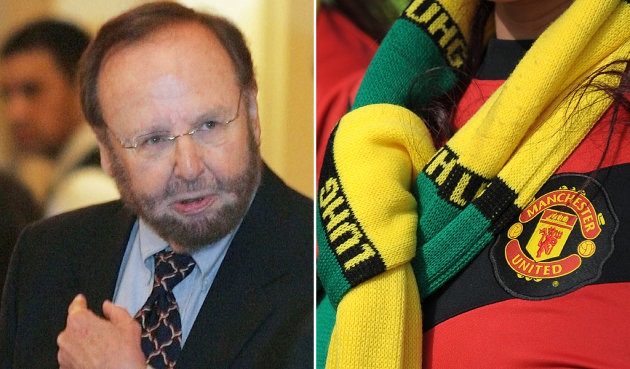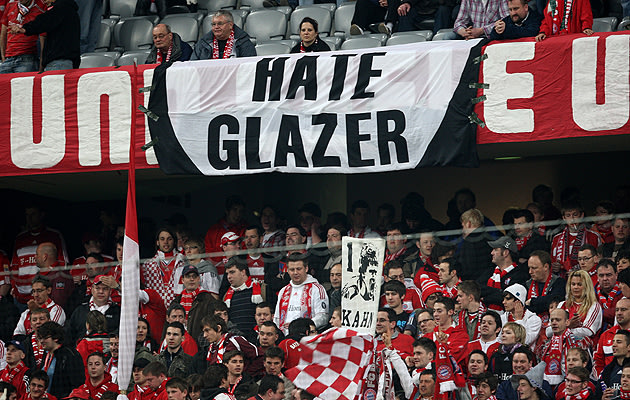In many ways Malcolm Glazer could be remembered as a respectable owner of Manchester United. He presided over a period of sustained success on the pitch, he encouraged a huge advance in commercial revenues and – unlike many a Premier League chairman - he made no attempt to interfere with the playing side of things, deferring all that to the presiding genius of the club, Sir Alex Ferguson.
There was, however, one significant aspect about Glazer’s ownership that will forever mitigate against him being considered anything other than a disaster for United, its fans and for English football in general: the method he used to buy the club in the first place.
Glazer was not interested in using his primary sporting asset for social advancement. He never turned up with a fanfare to watch United play live in the flesh, not even when they played in the three Champions League finals they reached in his time. He was not there proclaiming eternal loyalty, ensuring his face was on television, like Vincent Tan, or haplessly trying to sing along to the club anthem like Tom Hicks at Liverpool. Nor did he exploit it as a vehicle to promote his homeland like Sheikh Mansour.
Glazer wasn’t interested in any of that. Politics and personality meant nothing to him. He didn’t even like the sport. All he was interested in was the money United could deliver him. What motivated him was the hosepipe of ready cash it could provide into his ailing Florida property empire.
To get his hands on that cash, he engineered a quite shameless takeover employing a leveraged buyout. Effectively that meant taking out a vast mortgage on Manchester United which its customers were then obliged to pay off. An entirely debt-free organisation was thus immediately saddled with the largest deficit ever seen in the game.
Over the course of his near decade at the helm, £600 million had been leached out of the business simply to pay off debt charges solely incurred in order to facilitate his takeover. To put that figure in perspective, with that money United could have offered an entire stadium of free season tickets for the last 10 years and still made a profit.
Glazer came to England for one simple reason: he identified it as an easy target. Strict regulation in American sports would never have allowed him to buy out a franchise using that method. But English football was run without due attention, and his purchase was waved through with barely a glance. “We welcome foreign investments,” a Premier League spokesman said at the time. But Glazer wasn’t an investor. He was the opposite. He was a leach.
And with the success of his takeover, Glazer effectively demonstrated to the rest of the international trading world that English football was a business run by those asleep at the wheel. In his wake came a host of foreign businessmen whose intent was not investment but asset stripping.
There were Tom Hicks and George Gillett, a couple of American chancers who conducted a similar buyout of Liverpool. Far more damagingly, there was Alexandre Gaydamak whose leveraged ownership of Portsmouth plunged the club to the brink of oblivion.
Not that bankruptcy was ever likely to be the ultimate consequence of the Glazer ownership at United. The place was too sharp a money-making machine for that. Such was its scale, it was perhaps the only footballing business in the country which could be saddled with such crippling debt and survive.
But United’s hardcore fans were right to have been fundamentally opposed to his takeover. They were right to wave their green and gold scarves in opposition to his manoeuvring. They were right to attempt – after their successful lobby against Rupert Murdoch’s attempted takeover in 1999 – to try to use the law against him. Because ultimately it was them who were paying for the privilege of having Glazer as their chairman. It was their season ticket money – rising significantly over the 10 years of his ownership - that was being used to pay off an unwelcome, imposed debt.
Glazer’s death will change little at United. The next generation of his family – who have been running the place for most of the time anyway, with their father incapacitated by ill health in Palm Beach – still own the majority of shares (the rest were floated on the New York Stock Exchange two years ago in order to pay down some of the debt).
The financial priority is still to dispatch the profits westwards to Florida. The chance of a benevolent group of fan owners, interested in the place as a cultural landmark rather than a money-making engine, getting their hands on the club remains remote.
In truth, for most of those in the wider United fanbase, little changes either. For them, the only area of concern will be whether Louis Van Gaal manages to restore the team to something approaching competitiveness. They don’t give a hoot about who is the chairman, or how he got there, as long as the team is successful. Like the presiding authorities, they had little concern about the methodology employed in the takeover. And that, ultimately, is Glazer’s legacy.
He will be remembered as the man who got away with buying the country’s most renowned sporting institution using someone else’s money.



No comments:
Post a Comment